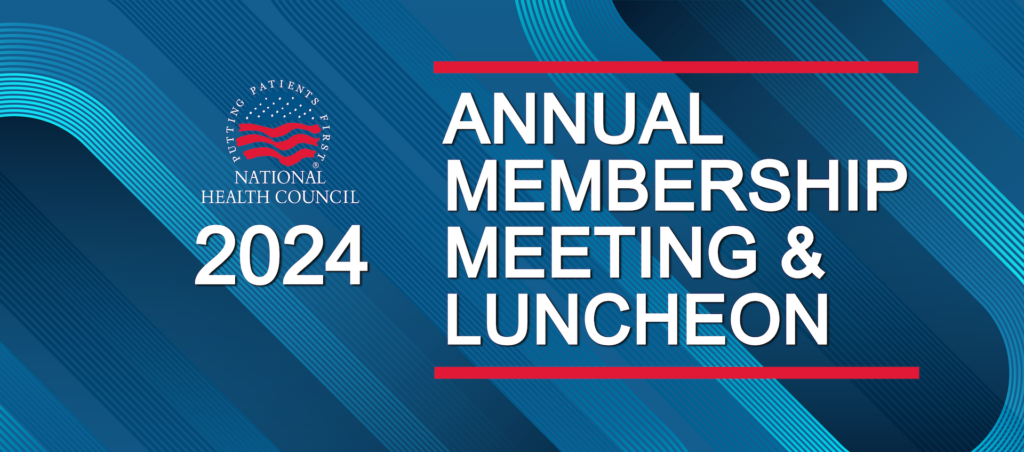

Legislative Update – July 2024
By: Allen Pinn, Policy Coordinator
With just over 100 days until Election Day 2024, it is easy to forget which legislative work still needs to happen before the end of the year. The House and Senate are in session for only two more weeks before the August recess and are not likely to have many legislative days in September, and none are scheduled for October. This means that most of the remaining work will be completed during a “lame duck” session when the current Congress convenes after the election. As the congressional calendar winds down the National Health Council (NHC) will keep a close look on several legislative developments as the lame duck session approaches and legislators prepare for the 119th Congress.
Health Care Legislation
There have been ongoing negotiations throughout the year about a slew of health care policy proposals. There is hope that several of these proposals could be put into one larger health care package and passed during the lame duck session. The primary driver of this will be bipartisan efforts to extend flexibilities that were put in place during the pandemic to increase the use of telehealth. The current flexibilities expire at the end of the year and there is bipartisan support for action before then. Although there are details to be addressed, this is viewed as a “must do” for Congress.
Issues that may be included in the package include:
- The bipartisan the Health Care Price Transparency Act 2.0 (3548), which increases the transparency of health care costs across the health care system;
- A package of Pharmacy Benefit Manager reforms (3430), including some provisions endorsed by the NHC, passed by the Senate Finance Committee last year; and
- The Safe Step Act (652) that helps remove the burden of step therapy on patients.
Artificial Intelligence
Artificial Intelligence (AI) recently has dominated conversations on Capitol Hill with many policymakers voicing excitement and concerns. The 118th Congress alone has proposed over 180 bills related to AI. Earlier this spring, the Committee on House Administration’s bipartisan Taskforce on AI released a report on AI strategy and implementation with five recommended guardrails including:
- Human oversight and decision making;
- Clear and comprehensive policies;
- Robust testing and evaluation;
- Transparency and disclosure; and
- Education and upskilling.
This was followed in May by a bipartisan group of prominent Senators, including Majority Leader Chuck Shumer (D-NY), Sen. Mike Rounds (R-SD), Sen. Martin Heinrich (D-NM), and Sen. Todd Young (R-IN) releasing a roadmap on AI innovation. In their roadmap, they emphasized the risks AI could have on society such as altering the workforce and national security implications, while also highlighting AI’s potential to revolutionize modern medicine and other facets of life. Notably, regarding health care and AI, the senators recommended the following:
- Consideration of legislation that expands AI in health care (with guardrails);
- National Institutes of Health development/improvement of AI technologies;
- Ensure the Department of Health & Human Services can weigh the pros/cons of the newest AI technologies to create regulatory structures;
- Consideration of legislation that provides transparency on AI to the public; and
- Consideration of policies that promote innovation of AI systems.
The direction that the Roadmap gives on addressing AI in health care includes a quote that reflects the NHC’s position, “patients must be front and center in any legislative efforts on health care and AI”. The NHC will continue to be a voice for the patient community advocating for centering the patient in all AI in health care debates. As dialogues around AI continue, it is certain that the next Congress and Administration will play a pivotal role in AI’s implementation and growth in the United States.
The next stage in Congressional activity will most likely be the release of recommendations from a House of Representatives Task Force that was formed for this purpose. At the NHC Washington Representatives Summer Meeting, House staffers expressed their goal to have these recommendations out by the end of the year.
Transparency & Other Issues
The NHC has continuously reiterated the urgency of legislative action regarding systemwide transparency. In addition to writing a letter of support for the Health Care Price Transparency Act 2.0, the NHC has endorsed several bills aimed at improving the lives of patients, many of which have been led by efforts of NHC’s members. These include:
- R.5699 Charles Rochester Blood Clot Prevention and Treatment Act;
- R.7165 Credit for Caring Act;
- 4120 Long-term Care Workforce Support Act;
- R.8018 Alleviating Barriers for Caregivers (ABC) Act;
- 4532 Improving Seniors Timely Access to Care Act;
- Increasing Medication Access for Seniors Act of 2024; and
- Broker Accountability Act.(to be introduced later this session)
Conclusion
The NHC will continue monitoring legislative and administrative developments surrounding the topics mentioned above. As Election Day 2024 unfolds, be sure to keep up with the latest dialogues and resources created for and by the patient community at NHC Connect.


